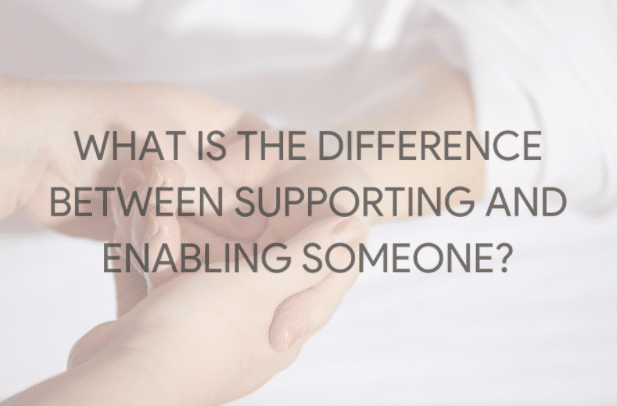Recovery from mental illness, or substance abuse is significantly easier when the patient has a good support system. Some may say a good support system is actually crucial for a successful recovery. Enabling them will only further hurt them.
When struggling with anything mental health related, or substance abuse, while it is certainly helpful to have people around to offer love and support, there is a fine line between supporting and enabling. At New Roads Behavioral Health, we want to help you spot that difference and support your loved ones.
Being a Healthy Influence

Healthy support does vary depending on the relationship between patient and supporter, but to simply is, healthy support is when judgment free sympathy is offered to the patient.
Healthy support may also include seeking resources for patients experiencing barriers – whether economic, lack of time, or mental struggles that may debilitate them to the point that they’re unable to reach out on their own.
Don’t be an Enabler

On the other hand, enabling a patient may be intended as support, but there is a fine line between support and enabling.
Enabling a patient can often occur when the enabler has endured the same mental struggles the patient has gone through.
For example, if a patient with anorexia is seeking comfort in a friend that is in active recovery from anorexia, what may come across and be intended as honest support initially may quickly turn into both people enabling one another to worsen their eating disorders.
This is detrimental in the end, resulting in a worse mental state for both people. Enabling is almost never intended to be harmful, but it can easily ruin a relationship and worsen the struggle of someone who was looking to seek help.
Enabling may also occur when a friend or family member takes it upon themselves to step in and repair the situation. Frankly, serious mental health struggles can only be aided by a licensed mental health professional.
However, in some cases, people may find it hard to just support a patient and suppress their natural desire to help.
Additionally, a patient struggling with addiction may be enabled by the people around them who try to excuse their behavior out of the desire to not admit that there is a deep seeded issue.
For example, a partner may excuse a patient’s excess drinking by saying, “They have been very stressed recently, it’s just to take the edge off at the end of a long day.” This kind of behavior is a detriment to the patient, and is offhandedly belittling a big issue.
Sometimes, enabling can look a lot like love, but enablers will only aid the patient into worsening the issue at hand.
Correct Good Intentions
It is undoubtedly difficult to love someone who is struggling with mental health issues.
Enablers may try to avoid confronting the patient out of fear of conflict. While the enablers may think what they’re doing is support and almost always have good intentions, it is actually worsening the situation and causing strain on the relationship between patient and supporter.
Learn How to be a Support

It is hard to navigate a relationship with someone who is struggling from mental illness – whether it be anxiety, depression, PTSD, eating disorders, or addiction.
Luckily, with the increase in studies about mental illness, there is also an exponential growth in resources to better learn how to support loved ones who struggle with mental illness.
That being said, there is no method of support that will work for every relationship. Support can be successfully displayed in many different ways, depending on a lot of factors. Learning to care for someone who struggles with mental illness will be largely dependent on the dynamic of the relationship.
If someone suspects a loved one is struggling with mental illness, there are some warning signs they can look for that might indicate an issue:
- Emotional withdrawal – This can present itself in lack of interest in usual activities or hobbies. Also, a drop in performance at school or work can indicate negative changes in mental health.
- Mood changes – Some patients may experience drastic changes in emotion in short periods of time.
- Lifestyle changes – Any drastic variations in a patient’s sleep schedule, diet, or personal hygiene may indicate a bigger issue.
- Illogical thinking – Some patients may experience inability to reason or form cohesive thoughts.
These symptoms do not always mean that someone is struggling with mental illness. Situational sadness is normal and healthy.
Situational Mental Illness
Consider anything negative that has happened in his or her life in the past few months – whether it be a death, financial hardships, or a breakup – they may just be experiencing normal (and crucial) grief.
While it is still important to support a grieving loved one, grieving is a necessary part of moving on and will usually dissipate in time.
Mental illness is more likely if these symptoms appear with no apparent trigger. There are also many other indicators of mental illness dependent on what exactly the loved one is struggling with.
This is why it is crucial to learn as much as possible about the specific diagnosis to better understand warning signs, triggers, and how to aid in coping and recovering.
Have Patience

First and foremost, and this goes for all relationships, the most crucial step is patience.
A lot of the time, people who struggle with mental illness have a hard time reaching out for support from their loved ones. Most of the time, this stems from fear of judgment or fear of being a burden.
Treating the patient with impatience or frustration can result in them hesitating to confide in someone the next time they are struggling. As family and friends, it is important to remember that recovery from mental illness is not linear and that getting better takes time.
Depending on their diagnosis, the patient is likely experiencing intense emotions. Drastic changes in behavior and mood are to be expected in recovery. In the event of those changes occurring, it is crucial to not add to that stress by becoming angry and tense in response.
If someone notices negative shifts in a loved one and is concerned that he or she may be struggling with mental illness, there is nothing wrong with confronting that in a loving and supportive way.
One of the most difficult parts of approaching this conversation is how to start it. It is important to not shame him or her for the symptoms they are displaying.
For example, if a parent is worried their child may be struggling with mental illness, or addiction, instead of saying, “I have noticed you are doing very poorly in your classes and you’ve been in a bad mood recently,” they should say, “I am worried about you. Is there anything I can do to help?”
The patient is much more likely to open up if they don’t feel as though they are being judged. Remind him or her that asking for help is a sign of great strength.
Know Healthy Boundaries
When a loved one is going through therapeutic treatment for their mental illness, loved ones can show support by giving him or her space to heal. A loved one should never push for details about a patient’s struggle, as that can be very hard to share with someone who isn’t trained to handle that information.
Please also note that if the patient expresses a desire to cause harm to themselves or anybody else, it is absolutely essential to call somebody who can help in the event of an emergency – whether it be the patient’s care team or 911.
Serious threats such as those need to be handled by trained professionals. That being said, family and friends should always remember to look after themselves and, if things suddenly begin to go poorly, to remember that it is not their fault.
Lastly, in having a relationship with someone who struggles with mental illness, it is important to not forget their own mental health.
Loving someone who is mentally ill can be very emotionally tolling. There is no shame in reaching out for therapy if that toll becomes too much to handle on their own.
Seek Professional Support
It is important to have someone to vocalize concerns, frustrations, or general grievances without impacting the patient’s recovery. An unbiased professional can help a loved one work through another person’s recovery all while helping them learn the difference between supporting and enabling.
This can also aid in preventing any resentment that might stem from the mental illness’s effects. It is also important to recognize and acknowledge their own limits of what kind of support they can offer.
Time and patience are crucial in recovery. Recovery is never a straightforward process. There will be both improvements and setbacks along the way. In the depths of mental illness, or substance addiction, a patient may not recognize or appreciate support. However, a great support system is key in a successful recovery.
Contact the professionals at New Roads Behavioral Health today to learn more about supporting your loved ones during recovery.

